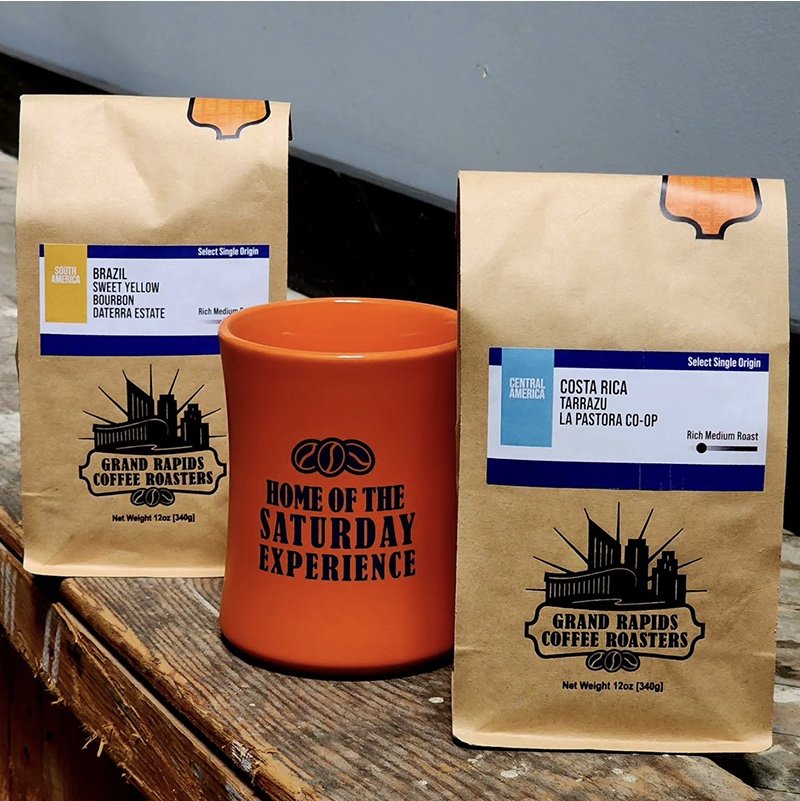Ethically sourced coffee in a reusable mug (Source: EB)
At EB Coffee & Pub (EB), owner Justin Nichols and his team envision a vibrant community hub where every cup of coffee tells a story of quality, sustainability, and connection. With nearly 30 years of serving the community of Caledonia, Michigan and the greater Grand Rapids metropolitan area, this neighborhood staple is taking on the responsibility of embracing a sustainable business model to create a healthier, stronger community. EB developed initiatives to advance its eco-friendly vision through goals aimed at making a positive environmental impact, and in turn enhancing the patron experience. From reducing waste with recyclable and reusable materials, to prioritizing local suppliers, and fostering partnerships with local community groups, the goal is to make sustainability an integral part of daily operations. EB Coffee & Pub demonstrates how small, local businesses can contribute to a sustainable future.
Incorporating Recyclable and Reusable Materials
A direct approach EB Coffee & Pub takes to prioritize eco-friendly practices is by incorporating recyclable and reusable materials into its operations. This work is highlighted by the restaurant’s available tableware. When dining in the café, patrons can expect to be served with locally purchased plates, trays, coffee mugs, and pint glasses; no single use options are available. When a customer is taking their goods to-go, EB has taken the steps to offer recyclable and compostable take-out containers, including coffee cups, coffee cup sleeves, and bakery boxes.
The café also features signage indicating how customers can properly dispose of their waste and a drop-box for patrons to leave their coffee cup sleeves for future reuse. EB also offers customers the opportunity to purchase a reusable, 20 oz, metal coffee mug and 64 oz glass growler that can be returned for a refill or exchanged for a new container, eliminating their personal single-use material waste altogether.
Reusable and Refillable growlers used for coffee, tea, and beer (Source: EB)
By encouraging patrons to dine-in with reusable tableware and offering eco-friendly takeout options with informative disposal signage, EB is taking steps to reduce its waste production and divert it to recycling programs or for restaurant reuse. By offering a reusable coffee mug or growler, EB is further giving the community an option to participate in its sustainability efforts by eliminating their individual café related waste. With these initiatives in place, EB was uniquely equipped to step up when a patron inquired about hosting a zero-waste graduation party at the café. By leveraging its reusable tableware, compostable containers, and creative waste diversion strategies, EB successfully demonstrated that celebrations can be both memorable and environmentally responsible. These efforts align with EB’s mission of creating an environment that promotes sustainability and encourages the community to make eco-friendly purchasing decisions.
Local Sourcing
A core value of EB Coffee & Pub is to provide its patrons with quality, healthy, ingredients and locally-sourced products. Nichols and his staff believe that these commodities are not coming from large chain restaurant webstores, but rather from the local cadre of farmers, roasters, and artisans. EB has diligently pursued local sourcing initiatives to populate the cafe’s brunch menu with fresh ingredients, adorn the walls with an array of artwork from local artists, and offer a coffee sipping experience with locally handcrafted mugs. Local farmers hand deliver their homegrown, pasture raised, antibiotic and hormone free products to EB on a regular basis, as opposed to frozen products shipped halfway across the country.
EB’s commitment to local and ethical sourcing is further evident in its partnership with Grand Rapids Coffee Roasters (GRCR) who routinely delivers their daily-roasted selections to the café. When purchasing local goods, the café is significantly reducing food miles — by decreasing the distance from farm to consumer, EB can minimize transportation-related emissions, support local producers, and ensure fresher, more sustainable products.
Ethical Sourcing Efforts
Coffee beans from ethically managed farms, roasted and packaged by GRCR, and brewed by EB (Source: Grand Rapids Coffee Roasters)
EB and GRCR’s partnership not only offers locally roasted coffee, but also procures the coffee beans from ethically managed farms around the world. Coffee blends that EB offers include a roast from the Ketiara Cooperative in Central Aceh, Western Indonesia. This entirely women-operated cooperative became organic and fair trade certified in 2012 and is committed to creating public health and education infrastructure in the region. An alternative espresso roast is from the Daterra Estate in Patrocínio, Brazil. The Daterra Estate was the first farm in Brazil to be certified by the Rainforest Alliance. While traditional coffee farms typically rely on deforestation and excessive fertilizer use, those certified by the Rainforest Alliance champion climate mitigation, fair working conditions, and ecosystem preservation throughout their operations.
By prioritizing local sourcing, EB reduces its carbon footprint by minimizing fuel use, packaging waste, and greenhouse gas emissions associated with transportation. For non-local products like pre-roasted coffee beans, EB supports ethical, fair trade, and organic farms with minimal environmental impact. These efforts lay the foundation for promoting sustainable practices among patrons and partners in the Caledonia and greater Grand Rapids communities.
Community Collaboration
EB Coffee & Pub’s commitment to sustainability extends beyond the daily operations of the café and reaches into the heart of the Caledonia community. EB has engaged with local groups such as the local high school’s environmental club and the community library to amplify its impact. A standout initiative has been the donation of recycled coffee grounds to the Caledonia Township Library and neighboring businesses, where they are repurposed as fertilizer in the library’s community garden and personal backyards. This practice not only reduces waste but also embodies the principles of a circular economy, transforming what would otherwise be discarded into a valuable resource that enriches soil, supports local ecosystems, and brings value to other members of the community. These efforts have strengthened local connections and demonstrate how small, collective actions can contribute to broader environmental goals.
Committing to a Sustainable Future
EB Coffee & Pub sets an example of how small businesses can make a big environmental impact while strengthening their communities. Through waste reduction, local and ethical sourcing, and meaningful partnerships, EB minimizes its footprint and embraces eco-friendly practices. As a local hub for both coffee and conversation, EB Coffee & Pub continues to inspire its community to take meaningful steps toward sustainability, proving that paving the way for positive change begins at the local level.
Article by Sam Dickman, University of Michigan ‘23, Sustainability Intern for Boyer Sudduth Environmental Consultants Published in PAISBOA Friday Flyer Volume XV, No.2





